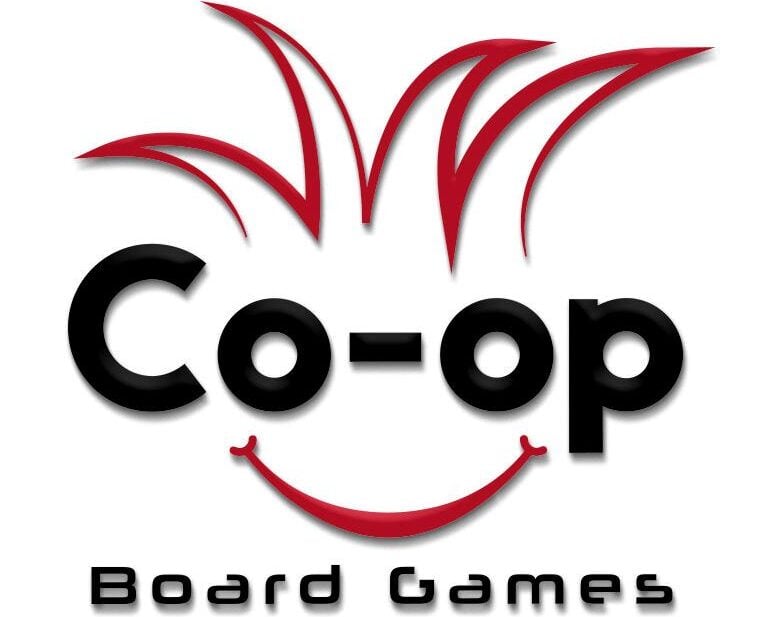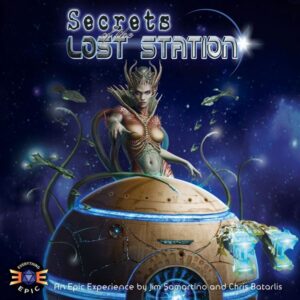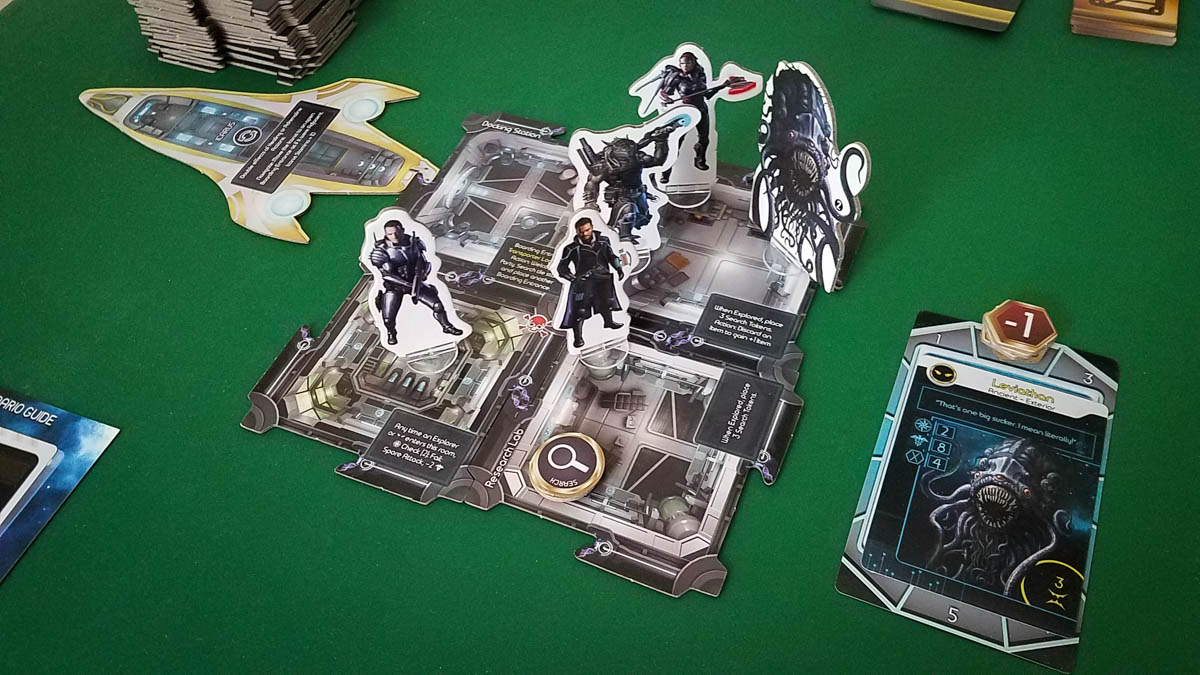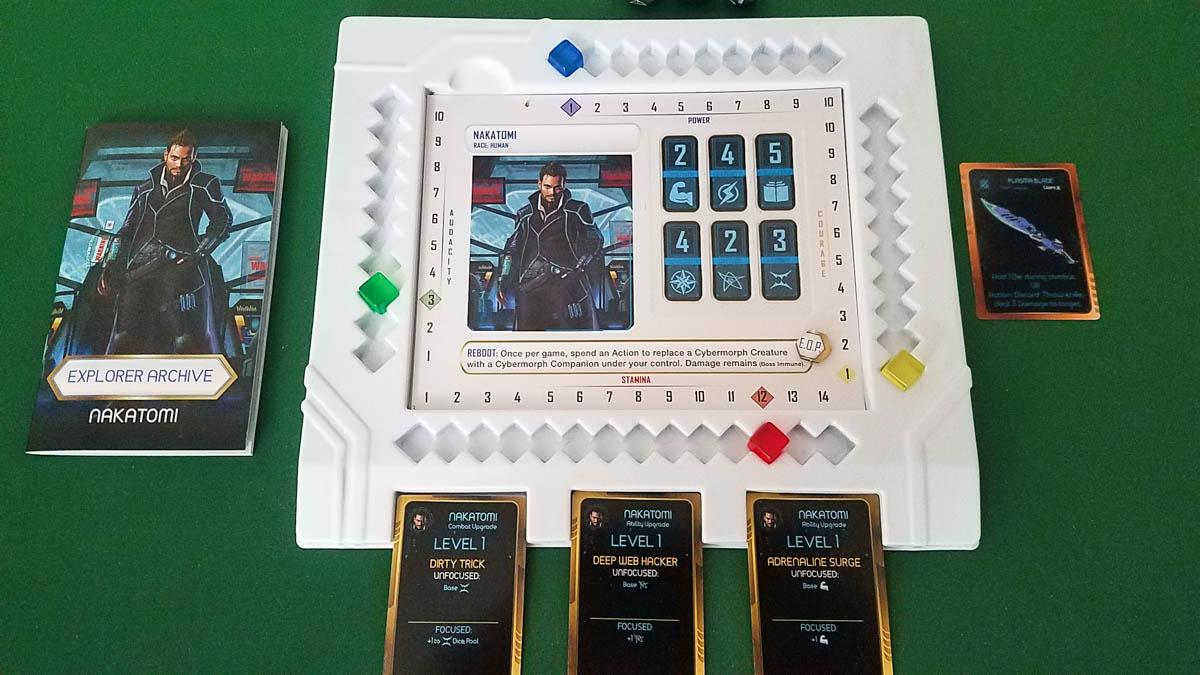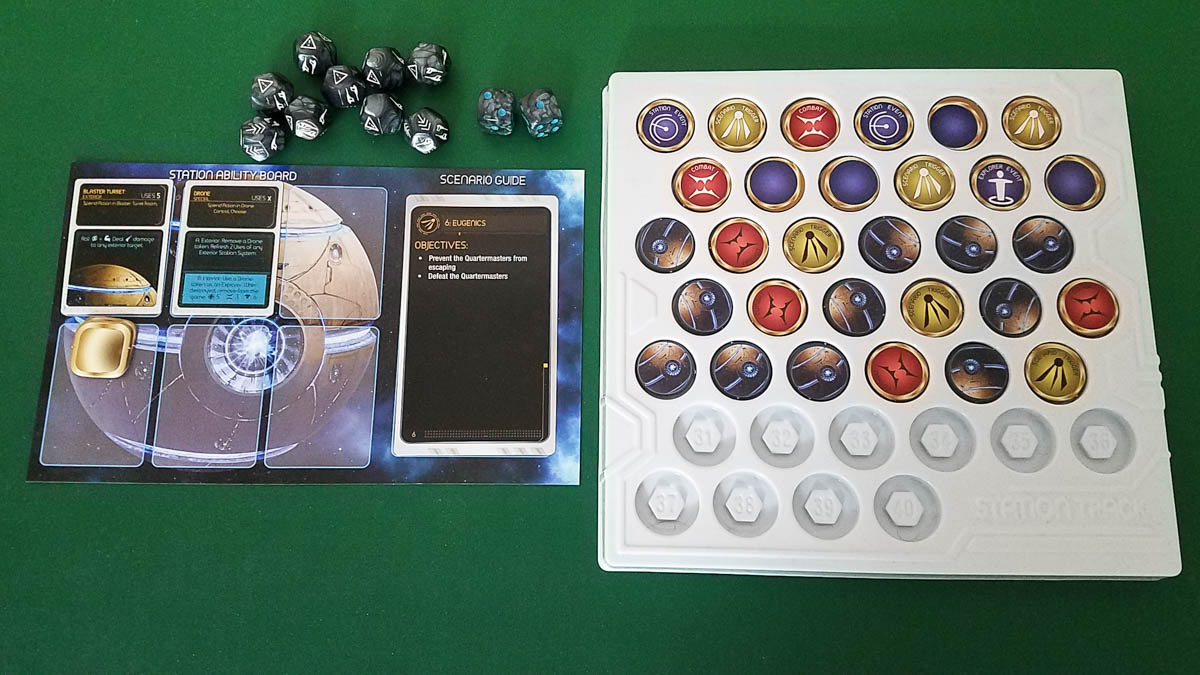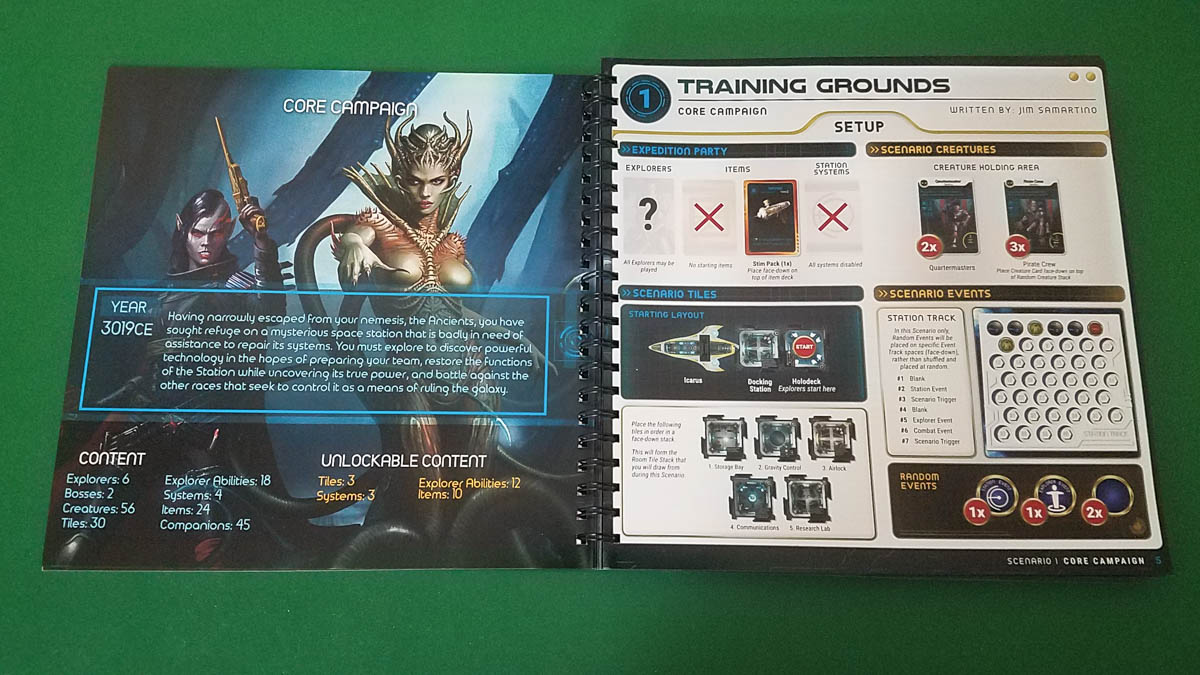Secrets of the Lost Station Review
Year: 2020 | Players: 1-6 | Minutes: 60+ | Ages: 14+
This Secrets of the Lost Station review was made after playing through the first campaign. We were sent a copy of this game by the publisher in exchange for an honest review.
What is Secrets of the Lost Station?
Secrets of the Lost Station is a sci-fi, adventure, campaign game in which you play as the last members of a 4000-year-old secret society who are tasked with defending the galaxy. During each mission you have to react to different events that take place on a mysterious space station, learn about your explorers, and fend off enemies.
Secrets of the Lost Station was designed by Christopher Batarlis and Jim Samartino, and it’s published by Everything Epic Games.
Rules Overview
Secrets of the Lost Station has 10 campaigns that you can play through, each containing a number of different scenarios with unique objectives. To start or continue a campaign, you simply choose your explorers and then go to the next scenario in the Scenario Guide.
Setting up a scenario is pretty straightforward since the guide lists all of the components you’ll need. Besides the story text, the Station Event Track will be different from scenario to scenario, with tokens that activate as you move through the game.
The explorers have six attributes – Strength, Dexterity, Knowledge, Mythos, Combat, and Movement – which will let you know how many dice to roll when performing those types of skill checks. Explorers also have four main adjustable stats: Stamina (health), Audacity (gives you rerolls), Courage (allows you to use the “focused” version of your ability cards), and Power (allows you to upgrade your abilities). Each explorer also has a unique one-use-per-scenario ability.
Player turns have a two-phase structure:
- Explorer Phase – You can perform one Move action (which could include revealing and placing a new Station room tile), one Explorer action (combat, activate an explorer/item/room ability, heal, etc.), and one of each free action (includes searching in some rooms and using items). During performance checks (including combat), you combine your base attribute with any bonuses you get from items and abilities, and then roll that many dice and hope for some successes.
- Station Phase – During this phase you flip and resolve the next token on the Station Event Track. If you flip a Combat event, either a new enemy will show up or all of the enemies on the space station will move and attack. If you flip a Scenario Trigger, you’ll read that passage in the Scenario Guide. The third type of token is the Random Event token, which could be a blank event (nothing happens), a Station Event (read the text in the Scenario Guide), or an Explorer Event (your explorer can “recall” some memories from their past and gets some stat boosts).
You’ll beat a scenario if you’re able to complete all of its objectives. You’ll lose if you don’t complete the objectives in time, if an enemy completes their objective, or if an explorer is “near death” (basically their health was reduced to zero twice and no one was able to revive them). If you do lose, you can choose to replay the scenario or move forward by using the Alternate Reality Control, which could have negative consequences later on.
As you move through a campaign, you’ll be able to unlock a whole bunch of stuff, including new characters, new upgrades for the explorers, new items, and new Station rooms.
That’s just a basic overview. Check out the Secrets of the Lost Station rulebook (PDF) for more info.
Pros and Cons
Pros
- Secrets of the Lost Station is a really good mix of story and game. I’ve only played through the first campaign so far, but in that campaign the designers did an excellent job of making the characters and the space station come to life through the story snippets. On top of that, the game has been consistently fun, both through its straightforward mechanics and the way that every decision you make can influence the story that plays out.
- There’s so much content! The scenario book is humongous (350+ pages), there are dozens of unique characters, and they even included a bunch of these “Undiscovered Packs” that you can plug into any of the scenarios to make them more challenging. This game must have taken forever and a day to create.
- It was a very cool idea to use the Station Event Track to end turns instead of the typical “flip an event card” phase found in a lot of other cooperative games. There’s usually a good amount of tension when you flip those Random Event tokens.
- One of the most exciting parts of this game is when events take place during your turn and you have to decide how to respond. Knowing that your decision could potentially have a negative impact on your team makes you want to take some time to think about it.
- The room tiles give you a whole bunch of unique actions to take. You can push enemies through portals, you can go to the Med Bay to get some extra healing, you can activate drones, you can go to the Bridge to rearrange some rooms on the Station, and there’s even an Arena where you can choose to fight to the death.
- Most of the scenarios feel different than the rest. There are unique objectives, different types of enemies show up, and the narrative helps to make each one feel fresh.
- This is the type of combat system that I like. You just add up your combined Combat stat, roll that many dice, and see if you did some damage and/or took some damage. You can then use your Audacity to reroll, making it a bit less random. It’s also great that combat is the same regardless of whether it’s an explorer or an enemy initiating it, giving the game better flow and making it easier to teach to others.
- I don’t know exactly what it is about these 10-sided dice, but rolling them is very satisfying… and you get to roll them a lot.
- The tutorial scenario is excellent. It teaches you the majority of the game’s mechanics while still giving you the freedom to play through a game.
- The character art is very nice. The standees look great.
Cons
- There are some pretty big errors in the scenario book. For example, one scenario (Scenario 4) tells you to put two specific room tiles to the side, but they’re actually supposed to be shuffled into the deck. I hadn’t seen the errata, so we wasted over an hour on that one.
- I do wish that the explorers’ ability cards were a bit more interesting. The abilities’ names are unique and make sense for the explorers they belong to, but most of them just give attribute boosts; they don’t really feel like “abilities”. Those once-per-scenario special abilities are very cool, though.
- Situations can pop up where you’re just waiting for something to get triggered on the Station Event Track, so you can end up without anything meaningful to do on your turn. That can be a bigger bummer in four-player games since you’ll have to wait a while to get another chance to make an important decision or take a fun action.
- It’s not easy to get everything to fit back in the box.
Final Thoughts
I was always excited to get to the next scenario during that first campaign, so yeah, I’m a big fan of Secrets of the Lost Station. Its gameplay is smooth, everyone gets to make a lot of important decisions throughout the campaign (both in the book and on the board), and the story that plays out is legitimately memorable. The game isn’t without its issues, but on the overall my group has had a fantastic time playing it.
I think most science fiction fans will love Secrets of the Lost Station. Also, if you’ve liked other storytelling board games in the past, chances are you’ll really enjoy this one. This is a big, expensive game, though, so if you don’t usually like the sci-fi genre, this probably isn’t for you.
I’m looking forward to playing more Secrets of the Lost Station campaigns and now I really want to find a copy of Secrets of the Lost Tomb, which has a theme that I’m a bit more interested in.
Secrets of the Lost Station Links
BGG | Amazon | eBay
Thanks for taking the time to read our Secrets of the Lost Station review!
Be sure to also take a look at our Best Co-op Board Games list and other rankings.
To stay updated on all things co-op board games, follow us on Facebook and X.
